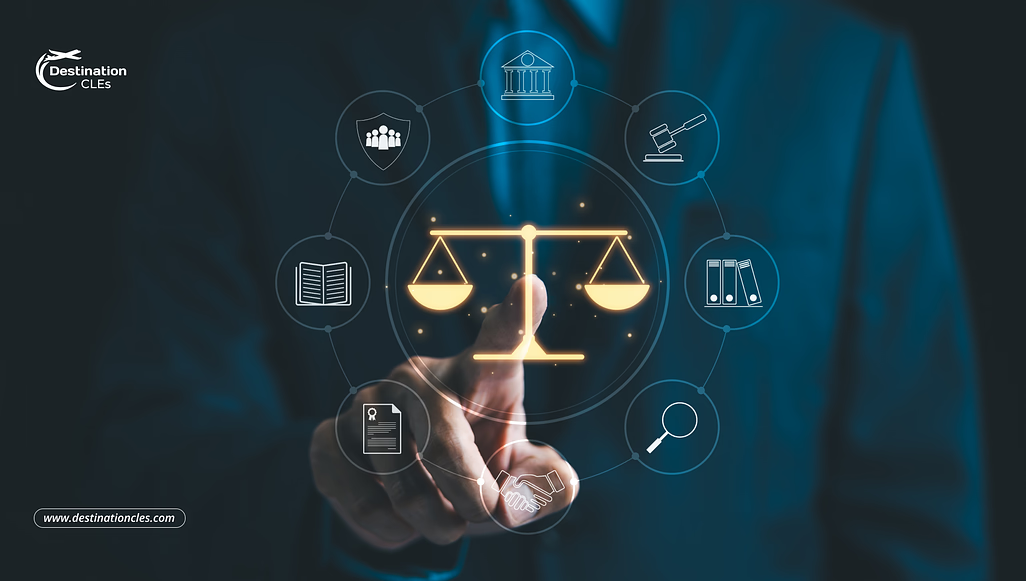Handling difficult legal client types can be a daunting task, and it’s often cited as the top stressor for many attorneys. The reality is a significant number of lawyers find themselves at a loss when it comes to managing these challenging interactions.
This hurdle often distinguishes the ordinary lawyer from the extraordinary one.
Why? Because without the skill to effectively manage tough clients, ascending the ranks in your career might prove to be a distant dream.
Even for the most seasoned professionals, navigating such situations can be akin to traversing rocky terrain.
In this article, we’ll explore effective strategies to handle the most challenging client types to help you turn those nightmares into manageable experiences.
The Reality of Difficult Legal Clients
Dealing with difficult legal clients is a common challenge in the law industry. These challenging individuals can create unnecessary hurdles and consume valuable time, affecting not just attorneys, but also administrative staff.
In the realm of legal practice, there are a variety of clients that professionals often encounter. From those who hold grudges like Vendetta Vince to those who vanish when needed most like M.I.A. Michael, each brings their unique set of difficulties to the lawyer-client relationship.
Emotional Involvement and Unrealistic Expectations
Emotional clients frequently expect everyone else involved to share this same level of commitment. They may have unreasonable expectations about the worth or outcome due to personal biases or a lack of understanding towards complex legal issues, such as how an actual legal process works.
This type of client might believe that you should always be a phone call away, which could lead to stress within your firm’s environment, disrupting workflow management systems already put into place for efficient handling of the client’s case.
Tackling Overzealous Clients
We’ve all encountered that obsessive client who conducts personal research into their own case based on flawed information found online. While it reflects an admirable level of engagement, these efforts can complicate matters if not guided correctly.
A good approach with these types of clients could be keeping communication lines open and providing regular updates about ongoing developments in the case. This keeps them informed accurately without feeling left out or resorting to unnecessary independent investigations which might muddle things up further.
Here’s some guidance on maintaining effective lawyer-client communication from the American Bar Association (ABA):
- Maintain Regular Communication: The importance of openness in communications ensures that your clients are updated regularly so they don’t feel neglected or anxious about the progress being made behind closed doors.
- Educate Your Client: Help your clients understand why certain paperwork is necessary and how different aspects of the trial work using simple language.
- Create Mock Courtroom Scenarios: This innovative method helps demystify complex proceedings while giving you a chance to explain procedural nuances step-by-step. It also helps with establishing your professional relationship with your client.
Setting Clear Boundaries With Dependent Clients
An equally complex situation arises when you encounter dependent clients, like Spineless Steve, who shirks responsibility by expecting attorneys to make decisions on his behalf that veer into personal life advice territory.
This expectation isn’t just about seeking legal advice—it ventures into areas where an attorney’s purview doesn’t reach.
While empathy plays a crucial role in managing any client relationship, drawing firm lines between professional obligations and personal involvement is one of the best possible solutions here.
Related: Alcoholism in the Legal Industry: A Crucial Discussion
Spotting Difficult Legal Clients Before It’s Too Late
The ability to identify potential problem clients early on can be a game-changer for law firms. This skill helps avoid unnecessary stress and saves valuable time, but how do you spot these kinds of clients?
Using your intuition as well as practical steps such as researching the client’s case history with PACER (Public Access to Court Electronic Records), you can identify potentially difficult clients.
A Strong Retainer Agreement is Your Best Friend
One of the most effective ways of managing truly difficult clients right off the bat is by having an ironclad retainer agreement at hand.
This document should clearly outline the services provided, payment terms, and conditions under which the attorney-client relationship may cease.
Decoding Misconceptions About Legal Processes
Understanding legal processes can be intimidating but is absolutely vital for anyone involved in legal services. This is because misconceptions about the legal system can obstruct effective decision-making and potentially compromise case outcomes.
Firstly, it is important to understand that legal processes are often complex and time-consuming. Contrary to popular belief, cases can take several months or even years to reach a resolution.
Another prevalent misunderstanding is the belief that popular media accurately depict real-life legal proceedings. In reality, legal processes are a labyrinth of detailed rules, procedures, and nuances best navigated with the guidance of seasoned legal professionals. A consultation with a qualified attorney can unravel the complexities of the law and set realistic client expectations.
Moreover, the cost of legal services is another area clouded by misconceptions. While many new clients perceive legal help as prohibitively expensive, alternatives such as legal aid, pro bono services, or contingent fee arrangements exist to make legal representation more accessible.
Overcoming these misconceptions requires sourcing credible information from reliable sources, consulting with legal experts, and advocating for your rights based on an accurate understanding of legal processes.
By confronting misunderstandings directly and maintaining clear communication, individuals can make well-informed decisions and better represent their interests within the legal framework.
Managing Stress Amidst Challenging Client Relationships
Managing stress amidst challenging client relationships is pivotal to success in the legal profession. It’s crucial to develop coping strategies that allow you to maintain your composure and professionalism, even when dealing with the most difficult clients.
Implementing self-care techniques can be a game-changer, helping you to diffuse tension and stay focused on delivering quality legal service.
Remember, managing these interactions effectively not only benefits your mental well-being, but also enhances your career prospects by demonstrating your ability to handle challenging situations.
Protecting Non-Lawyer Staff From Difficult Clients
Beyond personal well-being, it’s also crucial that we shield non-legal staff members from these stressful situations as much as possible. Administrative employees may not have the necessary training or authority to effectively handle complex lawyer-client relationship issues.
One way to do this is to create policies limiting direct contact between administrative staff and potentially bad clients. It’s also helpful to establish clear communication protocols that outline expectations about response times and appropriate conduct.
These measures can be helpful when considering whether continuing representation aligns with your firm’s values.
Handling Difficult Legal Client Types: The Ethics
In the legal industry, dealing with difficult clients is par for the course. Whether it’s a dishonest client or one who tends to be a loose cannon, maintaining ethical boundaries can often feel like walking on thin ice.
The lawyer-client relationship gets even more challenging when these individuals attempt illegal actions or go against agreed conditions in their case. Navigating these tricky scenarios can be risky, as it puts your professional credibility in jeopardy and could even lead to a malpractice lawsuit.
To navigate through such challenging scenarios effectively, clear communication and transparency are key. It’s important to make sure your client understands what constitutes unethical behavior by referring them to resources like The American Bar Association’s Model Rules of Professional Conduct.
Related: From Inquiry to Advocacy: How to Establish a Client-Lawyer Relationship that Lasts
The Role of Destination CLEs in Handling Difficult Clients
In the challenging world of law, continuing legal education (CLE) is a critical tool for staying up-to-date on the latest developments and enhancing professional competencies.
Destination CLEs, which combines educational courses with appealing travel destinations, has emerged as an innovative way to balance work and leisure.
These Eduvacation℠ experiences can play a crucial role in managing difficult clients. Here’s how:
Skill Enhancement: Through the expert-led discussions during these conferences, lawyers can gain practical insights and strategies to handle complex client situations effectively.
Stress Management: Dealing with difficult clients can be stressful. The relaxing environment of an Eduvacation℠ getaway with Destination CLEs can provide a much-needed break, helping lawyers recharge their mental batteries. This downtime can lead to increased patience and a fresh perspective when dealing with challenging clients.
Networking Opportunities: Destination CLEs offers a unique platform to connect with fellow legal professionals. These interactions often lead to the sharing of experiences and advice about handling difficult clients. Such peer-to-peer learning can be invaluable in finding new ways to navigate challenging client relationships.
Personal Development: Beyond specific legal skills, the Destination CLEs conferences often include sessions on communication, empathy, and emotional intelligence—all of which are key to managing difficult clients. These soft skills can help lawyers understand their clients better, manage expectations, and foster healthier client relationships.
In short, Destination CLEs offers valuable learning opportunities in a relaxed setting, which provides a comprehensive approach to managing difficult clients.
By attending these programs, lawyers can equip themselves with the necessary tools to turn challenging client scenarios into successful, sustainable professional relationships.
Related: Witness Preparation Tips for Optimal Trial Success
Conclusion
In conclusion, dealing with challenging clients is an integral part of the legal profession. However, by enhancing your skills, managing stress effectively, and maintaining ethical boundaries, you can turn these testing scenarios into opportunities for growth and learning.
Destination CLEs offers a unique and balanced approach to continuing legal education, combining leisure with learning.
It’s not just about adding more tools to your legal toolbox, but also about personal growth, networking, and stress management.
So, don’t wait—click here to explore your options and book your next Eduvacation℠ getaway with Destination CLEs.
It’s time to transform your professional journey and enhance your ability to manage difficult clients effectively.
Related:
- Alcoholism in the Legal Industry: A Crucial Discussion
- From Inquiry to Advocacy: How to Establish a Client-Lawyer Relationship that Lasts
- Witness Preparation Tips for Optimal Trial Success
DestinationCLEs.com is a participant in the Amazon Services LLC Associates Program, an affiliate advertising program designed to provide a means for sites to earn advertising fees by advertising and linking to Amazon dot com.
Recent Legal Tips & Travel Insights

Financial Planning for Lawyers and Law Firms: Secure Your Legal Practice

Why Attorneys Are Choosing Destination CLEs for Their Continuing Legal Education?

Social Media for Lawyers and Law Firms: 2025 Guide

7 Essential Tips to Improve Client Relationships in Your Law Firm

Best European Cities to Combine Work and Leisure While Attending a CLE

How to Overcome the Challenges of Managing a Virtual Law Firm?

The Complete Guide to Solo Travel for Lawyers: Tips, Tricks, and Essentials

Cybersecurity for Law Firms: How to Protect Client Data

CLE on a Cruise: Why It’s the Best Way to Earn Credits While Traveling

Weekend Getaways: How to Extend Your CLE Conference into a Vacation

How CLE Requirements Differ Across U.S. Jurisdictions for Lawyers?







